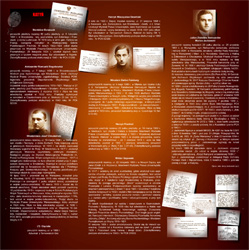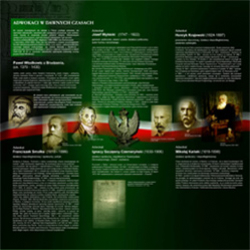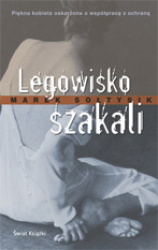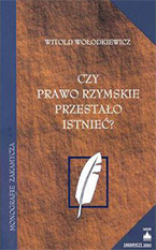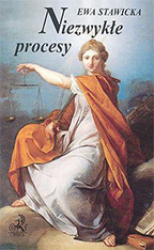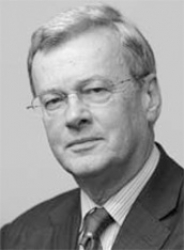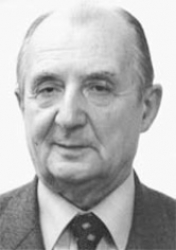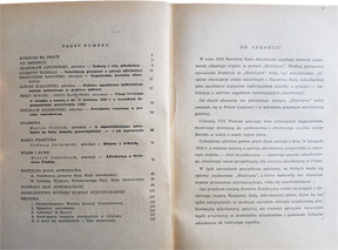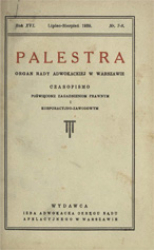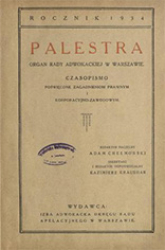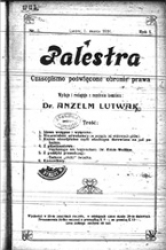"Palestra" monthly (ISSN: 0031-0344) is the oldest legal periodical published by advocates: barring short brakes, it has been on the market for over a hundred years. Currently it is published by the Polish Bar Council in Warsaw as the Polish Bar’s Periodical. But its history, going back to the period before Poland regained independence, is much more complex.
The title "Palestra" [The Bar] first appeared in print in Lviv in 1910. The periodical, then edited by an advocate, dr Anzelm Lutwak, was meant to express the views of advocates on the most important issues relating to law-making and application of law. From the very start, Palestra was designed as a journal that was open to all circles and professional groups of lawyers, representing a broad, multi-faceted and diverse view of the legal system. For various reasons, after publication of seven monthly issues, the project fell through. Fourteen years later, in independent Poland, in March 1924, the title "Palestra" reappeared as a journal of the Warsaw bar and very soon gained national renown and recognition. With short breaks, it was published until 1939. In principle, it is the Warsaw-based Palestra, published since 1924, that the history of the monthly, continuing to this very day, is linked. When we look at the origin of the advocates’ monthly discussing the problems of enacting and applying laws, it is worthwhile to remind about the profession’s several other publishing initiatives, which are part of the journal’s history in the broad sense.
In particular, we should go back to 1873, when "Gazeta Sądowa Warszawska" [Warsaw Court Gazette] began to be published. In a sense, it was treated as an advocates’ periodical, because for several decades, until the outbreak of WWII, renowned advocates were its editors and collaborators. Suffice it to say that an outstanding advocate, Henryk Konic, was the chief editor for 37 years! It was precisely this editorial board that acted as an underground organization of advocates in the Russia-occupied part of Poland, because the Advocates’ Support Fund was based on it.
Advocates’ literature also owes a lot to advocates from Lviv, where the aforementioned Palestra monthly was founded in 1910. The year 1913 saw the birth of "Czasopismo Adwokatów Polskich" [Polish Advocates’ Journal], which - though irregularly published - survived until 1939, including a Poznań-based edition with a sub-title "Dział województw zachodnich" [Western Provinces’ Section]. Other initiatives from Lviv were "Głos Prawa" [The Voice of Law], published in 1924-1939 and edited by the founder of Palestra, advocate dr Lutwak, as well as Nowa Palestra [The New Bar], published since 1933. In Krakow, in 1913 two titles appeared: "Przegląd Adwokatów" [Advocates’ Review] and "Głos Obrońców" [Defenders’ Voice].
In the interwar period, the world of advocates’ legal periodicals was very rich and varied. But it was the Warsaw-based Palestra that was unquestionably in the lead. When in 1956 the communist authorities permitted the monthly to be issued again, it referred back to the latter’s tradition. Since then, it has been published without breaks, first as "Biuletyn Naczelnej Rady Adwokackiej" [Polish Bar Council Bulletin], and since 1957 under its traditional title Palestra. The contemporary "Palestra" continues the traditions of all the above-mentioned legal periodicals published by advocates themselves. "Palestra" has always been a periodical of the Polish bar, discussing all problems relating to the applying and making laws. Regardless of the changing circumstances and conditions, "Palestra" never abandoned its character and mission. Over the years, it gradually transformed from a periodical for a certain professional group, focusing mainly on presenting problems relating to the profession of advocates, into a nationwide periodical for legal professionals, discussing all issues from the area of jurisprudence, including in particular application of law. Step by step, it became an academic periodical, with well-established internal structure, profile, and principles of publishing manuscripts following the examples accepted in professional, prestigious and renowned legal journals, having an impact on anything related to philosophical, theoretical, dogmatic, and practical reflection about law. It does not shy away from constitutional issues and responds to contemporary challenges. But at the same time it retains, in the right proportion and scope, the character of a periodical of the Polish Bar, nowadays also European and global Bar. It is unique due to its origins and historical determinants, its publisher, the group of authors, and the approach to law. The readership is also exceptional, comprising mainly advocates and trainee advocates, who together form the contemporary Polish Bar. It also reaches, on a broad scale, academics, judges, pubic prosecutors, and attorneys at law. It is interesting and important from the point of the Polish debates about law and rule of law. It successfully combines tradition and mission developed many years ago with the challenges of contemporaneity. It aspires to the role of a general legal journal, influencing the way of thinking about law, taking part in the formation of concepts that are decisive for the shape of the legal system, affecting the way law is interpreted and applied, and responding to all challenges facing the legal profession. It provides channels of communication between advocates and academia, courts and other elements of the administration of justice in the broad sense. The journal’s tone is set by its Editorial Board, composed of outstanding academics, advocates, judges, and other legal professionals, and supported by foreign members, representing renowned and prestigious schools of law.
"Palestra" presents academic papers, practical articles for lawyers, case notes, reviews of case law, reviews on case law in a wide sense, that is, substantive and procedural civil law (including commercial law, intellectual property law, and labour law) as well as substantive and procedural criminal law. There are also works that tackle issues in the area of administrative, constitutional and international law, as well as publications about the history of law and the profession of advocate. But what matters the most is how the topics are selected and approached. We want our Authors to prepare academic publications that will be attractive from the point of view of the work of our Readers, who are legal practitioners and theoreticians, in particular advocates and trainee advocates, as well as other legal professionals. "Palestra" has published works by: Stanisław Batawia, Andrzej Bąkowski, Krystyna Daszkiewicz, Zbigniew Doda, Ludwik Domański, Tomasz Dybowski, Henryk Ettinger, Lech Falandysz, Marian Filar, Lech Gardocki, Leszek Garlicki, Józef Gierowski, Juliusz Wiktor Gomulicki, Cardinal Zenon Grocholewski, Tomasz Grzegorczyk, Jan Gwiazdomorski, Jerzy Ignatowicz, Czesław Jaworski, Alfred Kaftal, Janusz Kochanowski, Archbishop Józef Kowalczyk, Zdzisław Krzemiński, Juliusz Leszczyński, Zbigniew Lew-Starowicz, Roman Łyczywek, Andrzej Marcinkowski, Edmund Mazur, Stanisław Milewski, Olgierd Missuna, Andrzej Murzynowski, Jerzy Naumann, Marian Niedzielski, Włodzimierz Odojewski, Lech K. Paprzycki, Stanisław Patek, Leon Petrażycki, Krzysztof Piesiewicz, Krzysztof Pietrzykowski, Stanisław Rappaport, Genowefa Rejman, Stanisław Rymar, Marek Safjan, Stanisław Salmonowicz, Mieczysław Siewierski, Leszek Sługocki, Mark Sołtysik, Ewa Stawicka, Adam Strzembosz, Adolf Suligowski, Mieczysław Szerer, Adam Szpunar, Stanisław Śniechórski, Władysław Terlecki, Andrzej Tomaszek, Stanisław Waltoś, Eugeniusz Waśkowski, Andrzej Wąsek, Jan Widacki, Witold Wołodkiewicz, Małgorzata Wrzołek-Romańczuk, Stanisław Zabłocki, Andrzej Zoll, and countless others. It is an impossible task to mention all those persons who contributed and are contributing to the high level and constant development of "Palestra". They deserve our gratitude. When reading past issues of Palestra, from many years ago, we wonder how many reflections and postulates still apply. This realization is rather bitter, because it makes us ask whether indeed, in so many areas, we are still where we were back then? And whether, despite the efforts of earlier generations of advocates, we failed to attain the objectives set by our predecessors?
More and more often, foreign authors’ contributions appear in the monthly. Little by little, next to papers in Polish, "Palestra" is starting to publish texts in English, opening the journal to readers working abroad.
In the history of the Polish legal thought, including also law studies, "Palestra" has played a special role. As a journal of advocates it has always been an open one, the sole criteria decisive for publication of texts being their contents and significance. A team of excellent reviewers is taking care of the quality of manuscripts. It is worthwhile to stress that on many occasions in the past "Palestra" was the only place where it was possible to publish texts based on reliable academic methods and not readily conforming to the expectations of those in power. In periods of intense control over legal journals, eminent Polish legal scholars chose to publish their papers in "Palestra". Another special feature of "Palestra" is its flexibility in responding to challenges connected with changes in the legal system. The journal’s distinctive is its regular monographic issues, published as needed. It is worth reminding that Palestra was the only Polish legal journal to decide to change the publishing schedule and to publish, in July 2015, a monographic issue devoted in full to the so-called great reform of criminal law, which introduced into the Polish legal system solutions based on the concept of limited adversariality of the criminal procedure. The texts published then were written by outstanding authors and they determined, throughout the period of validity of this regulation, the way the law was interpreted and applied. This idea of presenting the legal professionals with information about changes in the legal system, proposals of interpretations, taking into account the commonly accepted paradigm, support in times of system transformation, when we need a look based on broad knowledge, showing how to interpret and apply new provisions, is implemented in subsequent special issues, including the last special issue devoted to the amendments to the Code of Civil Procedure. Palestra provides also knowledge and information about special questions that are important for the practice of applying the law, especially protecting the individual’s rights and freedoms. Putting into practice this element of the mission saw the journal prepare a special issue on the advocate-client privilege.
"Palestra" also takes up issues connected with the fundamentals of contemporary constitutional democracies. Following the pattern of showing the links between certain problems and the daily application of law, "Palestra" publishes texts on issues relating to constitution-friendly interpretation, the concept of dispersed constitutional review, the importance of EU law in the process of applying the law in Polish courts, as well as a number of other issues of key importance for lawyers. Similarly Palestra does not shy away from texts from the field of philosophy and theory of law, especially if they are important from the point of view of interpreting and applying statutes.
As we write the remarks about the journal’s history and mission, we cannot neglect the persons who were responsible for its shape over the years. The first editor-in-chief and publisher of the Warsaw-based "Palestra" was Stanisław Car (1924-1925). He was followed by: Zygmunt Sokołowski (1926-1930), Adam Chełmoński (1932-1936), Stefan Urbanowicz (1937), while the last editor-in-chief before September 1939 was Leon Nowodworski (1938-1939). After WWII, starting from 1956, the journal’s editors-in-chief were: Stanisław Janczewski (1957-1964), Paweł Asłanowicz (1965-1971), Zdzisław Krzemiński (1972), Władysław Pociej (1973-1974), Zygmunt Skoczek (1975-1986), Edward Mazur (1987-1989), Czesław Jaworski (1989-1992), Stanisław Mikke (1993-2010), and then again Czesław Jaworski (from May 2010 to 1 September 2018).
What has "Palestra" been in the past decades? It has certainly had educational functions, it has provided information, and at times it has integrated the community to varying degrees. It defended, also the in the last dozen or so years, our identity based on tradition and on our common goals. When we think about Palestra's history, our thoughts often wander back to the interwar period. The main recurring theme from that time is the sense of responsibility for the fate of the Bar, the whole administration of justice, and for the good of the Homeland. In order to exemplify it, let us quote an announcement made by the Regional Bar of Warsaw, published in the second issue, dated 1 April 1924.
‘Facing a financial disaster, caused by the depreciation of the Polish mark, the Polish Government took action to protect the Treasury and to have healthier currency exchange rates. Regulations and other legislative means undertaken in that respect made it possible to obtain a considerable and rapid improvement in the state finance, to stop the ongoing depreciation of the Polish mark, and thus to lay ground for a currency reform. Following that, works are carried out to establish the issuing bank – the Bank of Poland. It must be, however, remembered, that even the most vigorous undertakings of the Government will be to no avail if the society fails to constructively support them. The stronger and the more vigorous this support, the better and more stable the outcome of the Government's politics to heal the country will be. This obliges the Polish Bar to join forces with the Government in this honorable task to repair the Treasury. Being strictly related, by virtue of the matters and interests entrusted to us, to the society's economic life, Polish advocates must substantially help the Republic by urging their clients to pay taxes and public levies, to subscribe for shares of the Polish Bank, and to donate to the State Treasury. To exercise such influence upon clients is a duty of every member of the Bar, dictated by the interest and by the well-being of the Republic/Nation. The Bar Council holds a strong conviction that the members of the Bar, who many times gave proof of their utmost devotion to their duties as citizens, will fulfil this obligation with complete understanding of its importance, zealously contributing to the work of improving the Treasury, thus setting an example for others to follow.’
In order to fully realize the significance of these questions to this day, let us reach to an article penned by Stanisław Car, titled ‘Our goals and program. Instead of a prospectus’, which was published in the inaugural issue of "Palestra" in 1924. ‘[...] The Polish Bar, which left a great legacy in the history of our public life and which can righteously take pride in its estimable centuries-old tradition, has not, however, managed to achieve in the Reborn Poland the status that, by the nature of things, it deserves to have in the new state being built. We gave praiseworthy testimony of our vitality twice in the time of occupation during the Great War, by selecting from among ourselves the Citizen's Judiciary in 1915 and next by filling the staff of the first Polish judiciary with the most prominent members of our profession in 1917 – the Bar in the afterwar period removes itself from the spotlight into the shadows, to the second line of those fighting for tomorrow, thus abandoning their previously prominent position in the public life without a fight. To this we can attribute the feeble role of the Bar is now playing in the Reborn Poland. [...] There is little doubt that the area of interests around which our lives now revolve has narrowed down profoundly; absorbed by the care for our financial situation, we focused on our daily practice, locked up in the walls of our offices, we lowered the bar of our social aspirations, unable to create a cohesive structure, one that would be conscious of its own influence and meaning, we remained dispersed, atomised, and lacking a sense of union or communal solidarity – in a word – we are gone! But still... how many fields by their nature, by design, belong to us. We just have to be willing. All we have to do is unite. Aware of our own gravity, we must leave the shelter of our offices and blend into the bustle of public life. From dispersion we must become a union, from loosely related individuals a professional group imbued with self-knowledge, tenaciously following the path once chosen [...]’ As we can see, the problems we are facing today are the same ones previous generations struggled with. We still walk the same path. This path, for sure, has no end. Nonetheless, the goal is clearly set.
